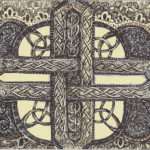We run our website the way we wished the whole internet worked: we provide high quality original content with no ads. We are funded solely by your direct support. Please consider supporting this project.
Podcast: What is ‘Deep Literalism’?
Greg discusses different levels of literalism and does a darn good impersonation of Garth Brooks.

Send Questions To:
Dan: @thatdankent
Email: askgregboyd@gmail.com
Twitter: @reKnewOrg
Greg’s new book: Inspired Imperfection
Dan’s new book: Confident Humility
Subscribe:
Category: ReKnew Podcast
Tags: Crucifixion of the Warrior God, Cruciform Theology, Hermeneutics
Related Reading

Podcast: The Making of Crucifixion of the Warrior God with Tony Jones
Dan and Tony talk about Greg’s books Crucifixion of the Warrior God and Cross Vision. Tony reveals what it was like to work with Greg, what the publishing industry is like right now, and what prospective authors can do to publish their own book. Tony’s recent book is available here: Did God Kill Jesus http://traffic.libsyn.com/askgregboyd/Episode_0423b.mp3…

The Cross and The Trinity
Out of love for humankind, Scripture tells us, Jesus emptied himself of his divine prerogatives, set aside the glory he had with the Father from before the foundation of the world, became a human being and bore our sin as he died a God-forsaken death on Calvary (Phil 2:5-7). Though Jesus remained fully God, he…

Rethinking Transcendence
Going back to pre-Socratic philosophers and running through the major strands of the church’s theological tradition, the conception of how God (or, in ancient Greece, “the One”) was arrived at primarily by negating the contingent features of the world that were deemed inferior and in need of explanation. God transcended the world, for example, by…

From Boston, With Love
We posted some of T. C. Moore’s reflections on the Open 2013 conference earlier this week. T. C. lives in Boston and was deeply moved by the violence and terror that came to his city. Now we want to share his most recent blog post Oz and the Cross: Reflections on God’s Love and the…

Podcast: How Does the Story of Achan In Joshua 7 Point to the Cross?
Greg looks at a violent Old Testament story through a Cruciform lens. http://traffic.libsyn.com/askgregboyd/Episode_0447.mp3

Part 4: An Alternative Cross-Centered Approach
Image by Karl Pang via Flickr As I mentioned in Part II of this review, I am deeply appreciative of the fact that Flood grasps the centrality of enemy-loving non-violence in Jesus’ revelation of God. And while many, if not most, of the depictions of Yahweh in the Old Testament are consistent with this revelation, I…



